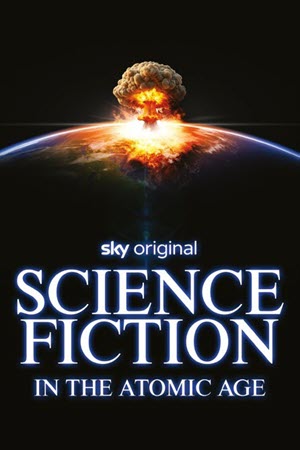Science Fiction in the Atomic Age
 I have enjoyed Adrian Munsey’s two previous forays into SF&F documentaries. The original series looked in some detail at British writers of children’s fiction in the 19th Century. It covered famous names such as JM Barrie, AA Milne, Beatrix Potter and, of course, Tolkien, but also some less well-known writers. Unusually it looked at the lives of the writers, to see how their particular circumstances might have influence what they wrote.
I have enjoyed Adrian Munsey’s two previous forays into SF&F documentaries. The original series looked in some detail at British writers of children’s fiction in the 19th Century. It covered famous names such as JM Barrie, AA Milne, Beatrix Potter and, of course, Tolkien, but also some less well-known writers. Unusually it looked at the lives of the writers, to see how their particular circumstances might have influence what they wrote.
Series two looked at The Gothic. Again the focus was quite tight, though it did wander all the way from The Castle of Otranto to Wuthering Heights, and from Dracula to Dorian Gray. It also brought in Freud’s theory of the Uncanny, which seemed reasonable because Freud was popular and taken seriously when many of the books being examined were written. And in any case, Gothic fiction relies on psychological horror for effect.
The new series, which is on Sky Arts rather than the BBC, is called Science Fiction In The Atomic Age. Like its predecessors, it is four one-hour episodes. And reader, it is a mess.
The title is somewhat clickbaity. The series begins with Mary Shelley and includes Verne and Wells, all of whom were active before the atom bomb was invented. Wells did predict such a device, but he massively underestimated its destructive power. Then there is WWII, and from there the series tries to cover the whole history of science fiction. In four hours. That would be a challenge to anyone.
I should note that the series has some excellent contributory talking heads, including John Clute, Farah Mendlesohn, Adam Roberts, Mark Bould, and even a brief appearance by Tade Thompson. I do not hold any of these people responsible for the final product. I know how these things go. You get interviewed, and do your best to give coherent answers to a bunch of leading questions. You have no control over how those answers are edited into the documentary, and in this case all the responses are devoid of context, in that we are never told what they question was.
The series starts well enough, looking at the origins of science fiction in a time of heady scientific progress and American exceptionalism. It then looks at how things like the demise of the space programme have punctured the optimism of the science fiction project. By episode 3 it has got on to Le Guin and Butler, and the rise of social SF. And it goes straight from there to Ted Chiang and Arrival.
There are lots of things you can get wrong about telling the history of science fiction, but skipping over the whole of cyberpunk seems pretty high on the list of potential faux pas. Except that it does get a mention in episode 4, when the series is talking primarily about AI. There is even a supposed quote from Neuromancer used as voiceover for a piece about robots. I don’t know the book well enough to recognise the text used, but I suspect it was the caption that was wrong.
What episode 3 does do is engage in what can only be describe as psychoanalytical bollocks. Freud, and Joseph Cambell, do get a proper airing when it comes to discussion of Star Wars in episode 4, but Cambell is mentioned in episode 3 without any explanation. It is sloppy narrative structure. And as for the Freudian stuff…
Instead of looking at cyberpunk in its proper place in history, episode 3 goes on an extended rant about The Matrix. Apparently it is bad because it says the wrong sort of thing about superheroes, or doesn’t, the narration wasn’t clear. Also it is bad because gender transition means that you can no longer have a Oedipus Complex, which means that Freud’s theories no longer work.
Munsey returns to the Wachowskis in episode 4 and shows what I think are a couple of pictures of them pre-transition. That’s the video-equivalent of deadnaming, and completely unnecessary. I was very unimpressed.
I should also add that there are times when it is not at all clear whether the voice-over is from one of the talking heads, a quote from a book, or editorialising by Munsey. And some of the choices of images used are very odd, and seem to have nothing to do with the narrative.
This is very disappointing, given how interesting the previous two series were.